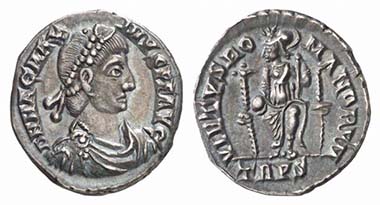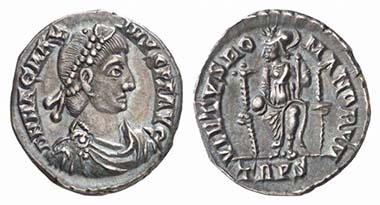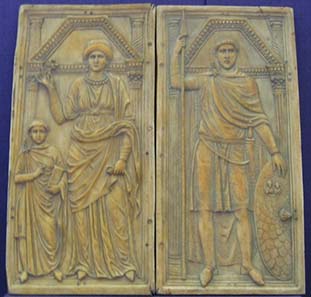Magnus Maximus or the Last Romans in Britain
by Björn Schöpe
courtesy of Barbara Balz / World Money Fair
On the reverse of the small silver coin, Roma sits imperiously on a throne, holding a globe as symbol of world rule and a spear to enforce this claim. But the lustrous shine of silver hides the fact that this fine coin was one of the last of its kind in the north. Around 400 AD, Britannia was breaking away from the Roman Empire, the currency of the occupiers being gradually replaced by barter economy. More than ever, Rome’s claim to global rule was turning into an illusion.
Magnus Maximus (383-388). Siliqua, Trier, 383-388. Draped bust wearing pearl diadem. Rv. Roma seated facing with globe and spear. RIC 84b. From Künker sale 115 (2006), 856.
Depicted on the obverse, a resolved look on his face, is the usurper Magnus Maximus who made an unusual career. As Roman Emperor Macsen Wledig, he found his way into Welsh mythology. According to the myth, Wledig undertook the conquest of Britannia to marry a Welsh princess. When a usurper rose up against him in Rome, he went to meet his adversary in battle and effortlessly defeated him.
Reality, however, was different: Magnus Maximus, commander of the Roman troops in Britain, was a usurper himself. For the Roman emperors, the island of Britain had been a weak point ever since. Located in the outer reaches of the empire – Caledonia in the north was never under Roman control –, the province’s borders had to be well secured by the military to prevent its inhabitants from breaking away from the Imperium Romanum. Repeatedly, the concentration of military forces tempted the legates to revolt against Rome, as it was far away and getting weaker and weaker.
Nevertheless, it took Magnus Maximus great efforts to enforce his claim outside Britain. His soldiers proclaimed him emperor in 383 AD, but immediately hereafter he saw himself forced to go to the European mainland with the greater part of his army where he spent the following years confronting his rivals. In 388, Maximus the usurper died on the continent, killed by his own soldiers.
Stilicho (r.) with his wife Serena and the son Eucherius (l.) on an ivory diptych. Replica from Römisch-Germanisches Zentralmuseum Mainz. Original c. 395 AD, today in Monza. Source: Wikipedia.
In Britain though, the influence of Rome was in irreversible decline; the cities were languishing; people were returning to the ways of their free forefathers of pre-Roman times. In 398, the Roman general Stilicho crossed over with an army to fight back the tribes of the Picts and the Scots who were invading the south from Scotland. But that was just a last effort to defend the province. Around 410, almost all of the remaining soldiers left, being badly needed elsewhere. With them, Roman coins disappeared from the island, as well. The country had to pass through hard times – the Dark Ages – before stable kingdoms were set up again.
This article was written for the catalogue of the World Money Fair 2012 whose Guest of Honour is going to be Great Britain. More on the World Money Fair 2012 you will find here.










